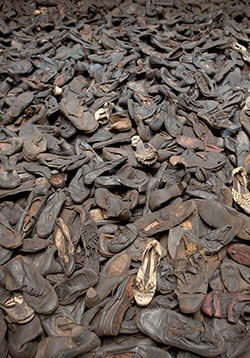Connection between Holocaust, abortion hits home for young adults

Shoes confiscated from prisoners at Majdanek, on loan to the U.S. Holocaust Memorial Museum from the State Museum of Majdanek, Lublin, Poland. (Photo by U.S. Holocaust Memorial Museum)
By Natalie Hoefer
After becoming aware of the inhumane horrors found in Nazi concentration camps at the end of World War II, the world swore that it would never forget, that it would never again allow a dictator or government to murder races or classes of people it subjectively deemed unfit to live.
In 1973, the U.S. Supreme Court Roe v. Wade decision legalized the killing of children in the womb subjectively deemed unworthy of the right to life.
During their pilgrimage to Washington, the Archdiocese of Indianapolis young adults who participated in the March for Life on Jan. 25 had their eyes opened to the disturbing parallel between the Holocaust and abortion. (Related story: First-time participants moved by their March for Life experience)
Before participating in the march, the group visited the U.S. Holocaust Memorial Museum in Washington.
Rikki Enzor, a 26-year old medical student, found the visit to be a “powerful and moving” experience.
“That was a really good preparation for going on the walk,” she said. “It let the moral implications of taking the life of other human beings sink in.”
When Enzor later saw banners with pictures of aborted babies during the march, she said it made the connection to the Holocaust “really hit home.”
The third-year medical student explained, “Things that the Nazis did, like eugenics, those are things that are being talked about now—whether we should abort all babies with certain genetic disorders.
“We’re basically considering making decisions about how valuable a particular human being’s life is based on something beyond that person’s control, without considering that it’s a human being created by God in his image and likeness, that is unique, that has a spirit and a soul.”
In addition to visiting the museum, the pilgrims watched a documentary titled 180. In the film, evangelist Ray Comfort uses logic to walk pro-choice individuals through the comparison between the Holocaust and abortion.
When asked if they would bury Jews alive in a mass grave if held by gunpoint and told to do so, most of the people Comfort interviewed said absolutely not because such an act is akin to murder.
Then when asked if they believed in abortion, most said “yes” because it is a woman’s choice.
March for Life participant Mike Gramke, a 25-year-old member of St. John the Evangelist Parish in Indianapolis, noted, “Many in the Church, myself included, think that abortion exists because of a rampant submission to relativism, [the belief] that choice is the highest of all values.”
He pointed out that Comfort’s question of burying Jews alive “is to show that there are truly right and wrong choices that have moral consequences.”
As the line of questioning in the documentary continued, interviewees came to realize that one woman choosing to kill a child in the womb is no different than one man—Hitler—choosing to kill those people he deemed unfit to live.
Gramke explained, “After asking whether it is a child in the womb, the ultimate question [Comfort asked of the interviewees] is, ‘When is it OK to kill a child in the womb?’ ”
Many of the interviewees realized the only correct answer to that question is “never.”
The parallel was clear to 28-year-old March for Life participant Andrew Costello, a member of St. Joan of Arc Parish in Indianapolis.
“It makes me sad when I realize that people don’t equate the atrocity of the Holocaust with the abortion problem in our country,” he said. “A human person is a human person is a human person. We don’t define when personhood begins; only God does.
“If one believes in true social justice based on a set of moral principles, then abortion is an egregious crime with devastating social, familial, physical and economic consequences.”
This point is illustrated by a quote from Martin Niemoller, a World War II-era German Protestant pastor who at first remained silent in the face of what later became known as the Holocaust. He eventually took a stand against Hitler and spent seven years in a Nazi concentration camp. The quote, which hangs upon a wall in the U.S. Holocaust Memorial Museum, reads:
“First they came for the Socialists,
and I did not speak out—
because I was not a Socialist.
“Then they came for the Trade
Unionists, and I did not speak out—
because I was not a Trade Unionist.
“Then they came for the Jews, and I did
not speak out—
because I was not a Jew.
“Then they came for me—and there
was no one left to speak for me.”
